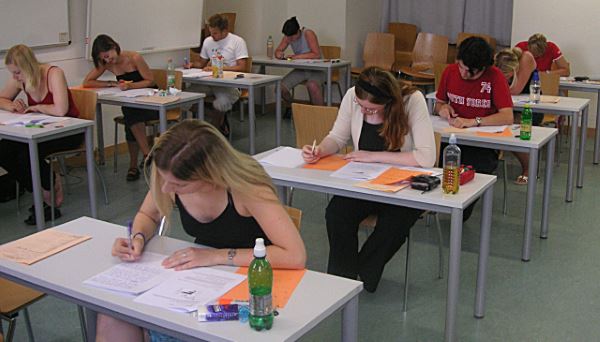New updates diminish the value of ACT

A group of students takes the “old” ACT–taking all 4 sections of the test in one sitting.
November 13, 2019
Every year, we seem to be catering to an increasingly apathetic student body. First was the elimination of high school exams. Then, a localized failed but notable attempt at a “no zero grading policy.” Now, an ACT that allows students to complete their test in multiple sittings– because it is simply unimaginable that today’s students be asked to complete the task of sitting still and taking a three hour test in one day.
The ACT, a standardized college entrance exam, has announced plans to change the test for fall 2020 in order to “better serve students” by allowing them to retake certain sections of the test. Consequently, with the price of a fee, they will have the opportunity to take one section of the ACT at a time. This modification to the test stands in stark contrast to the existing policy, where students who want to improve their scores must retake the entire test in one sitting.
To some students, the fee price to take ACT sections one at a time sounds like a very good deal. To others, it means even more disadvantages. With this new modification, student scores will inevitably increase, as they can choose to focus their study efforts on one section instead of four. While seemingly great for them, the students that will not be able to afford to do this will suffer the greater competition for higher scores without having a fair chance to react. ACT tutors, study books and preparatory courses all clearly favor the wealthy– this new ACT is just another item to add to the list. Not only does this ACT modification further benefit the already benefiting, it allows for students to receive standardized test scores that they may not actually deserve.
There is a reason that the ACT has been administered in one sitting. This test is supposed to be an accurate measure to colleges of both knowledge and exam test taking skills. The ACT gives colleges an idea of how you will fare on college exams. College exams are taken in one sitting. There is no studying for only 1/4th of the test. There is no retaking parts that you do not perform well on.
While the ACT claims that their future changes will better serve students, they really mean that their future changes will better serve student test scores. The score inflation that next year’s ACT test takers are excited for is only skewing the truth. It is a given that students will get higher scores. While the ACT claims that this is students “reaching their full potential,” it is really just college board capitalizing once again off of society’s widely held belief that a high standardized test score will get students into the college of their dreams.
Furthermore, many supporters of the new modifications to the test argue that the changes will report how a student tests as a whole and not just how a student tests on a certain day. However, part of how a student tests as a whole is how they test on a certain day. The entire basis of testing is built upon this idea. If taking a test on a certain day is not an accurate representation of a student’s knowledge and competency, the entire testing and educational system is not and has not ever been accurate.
These ACT changes are only going to lead to the question of whether students should be able to take math tests, history tests, science tests, on the day in which they feel that they are at the peak of their knowledge and in however many sittings they feel necessary to best ensure success. If taking the ACT in one sitting is unfair to intellectual measurements, there is really no limit to what else is unfair.
These changes will also result in a collective depreciation in value of ACT scores against their SAT counterpart. This will cause schools not to move away from standardized tests as a whole, but instead, to move away from the ACT. Those students that reported better performance on the ACT than the SAT will lose their ability to choose.
Additionally, the proposed changes to the ACT are entirely unnecessary and will hurt students in the long run. Students will put less effort into preparing, as their mistakes are more easily corrected. Their hand will be held through the standardized testing process. They will be held to lower standards than students were in the past.
Ultimately, the ACT’s modifications will inflate student standardized testing scores while taking out the entire purpose of standardized testing– to give an accurate score. While ACT claims that the changes will help students, the only thing that will really help them is to leave the test the way it is.

